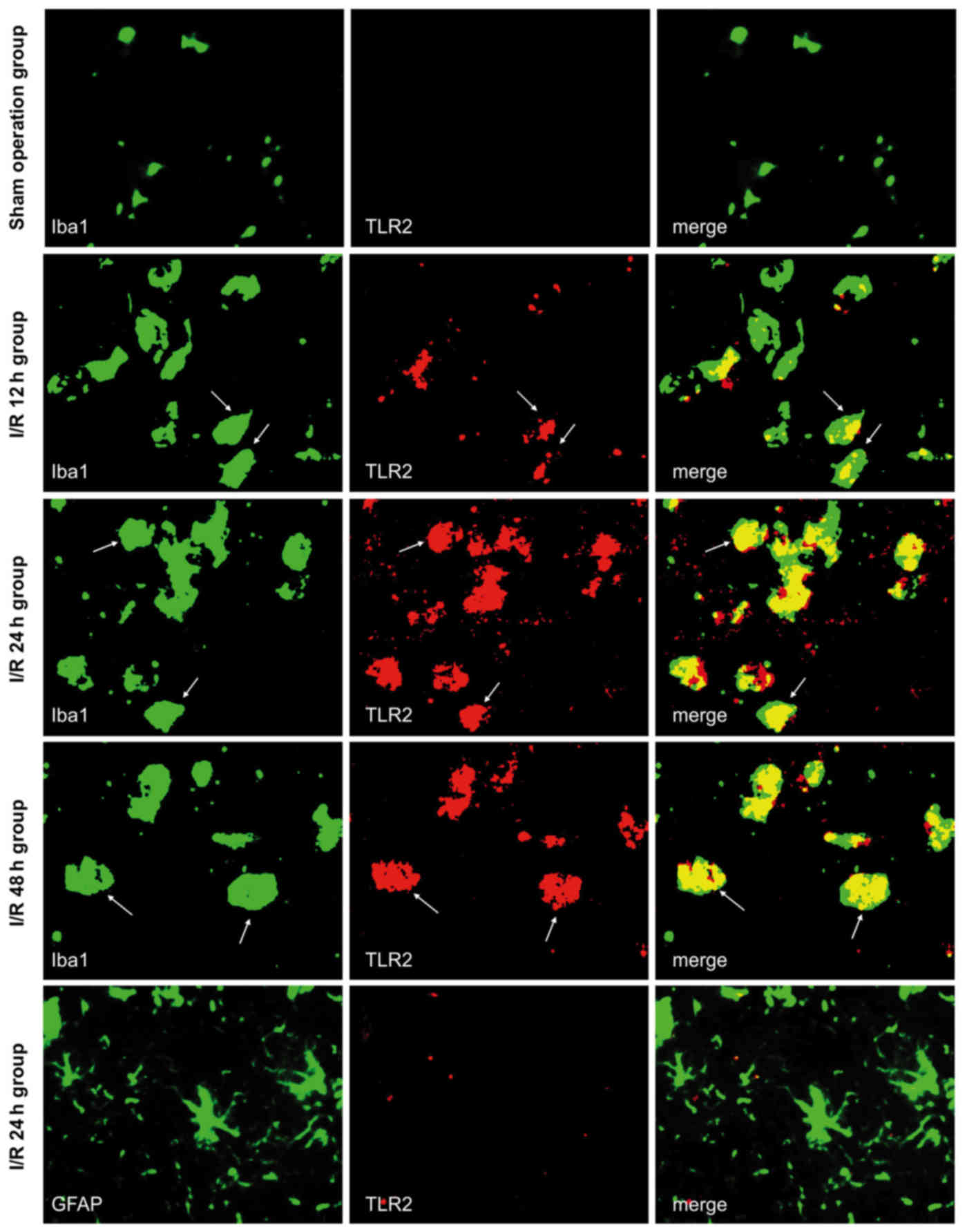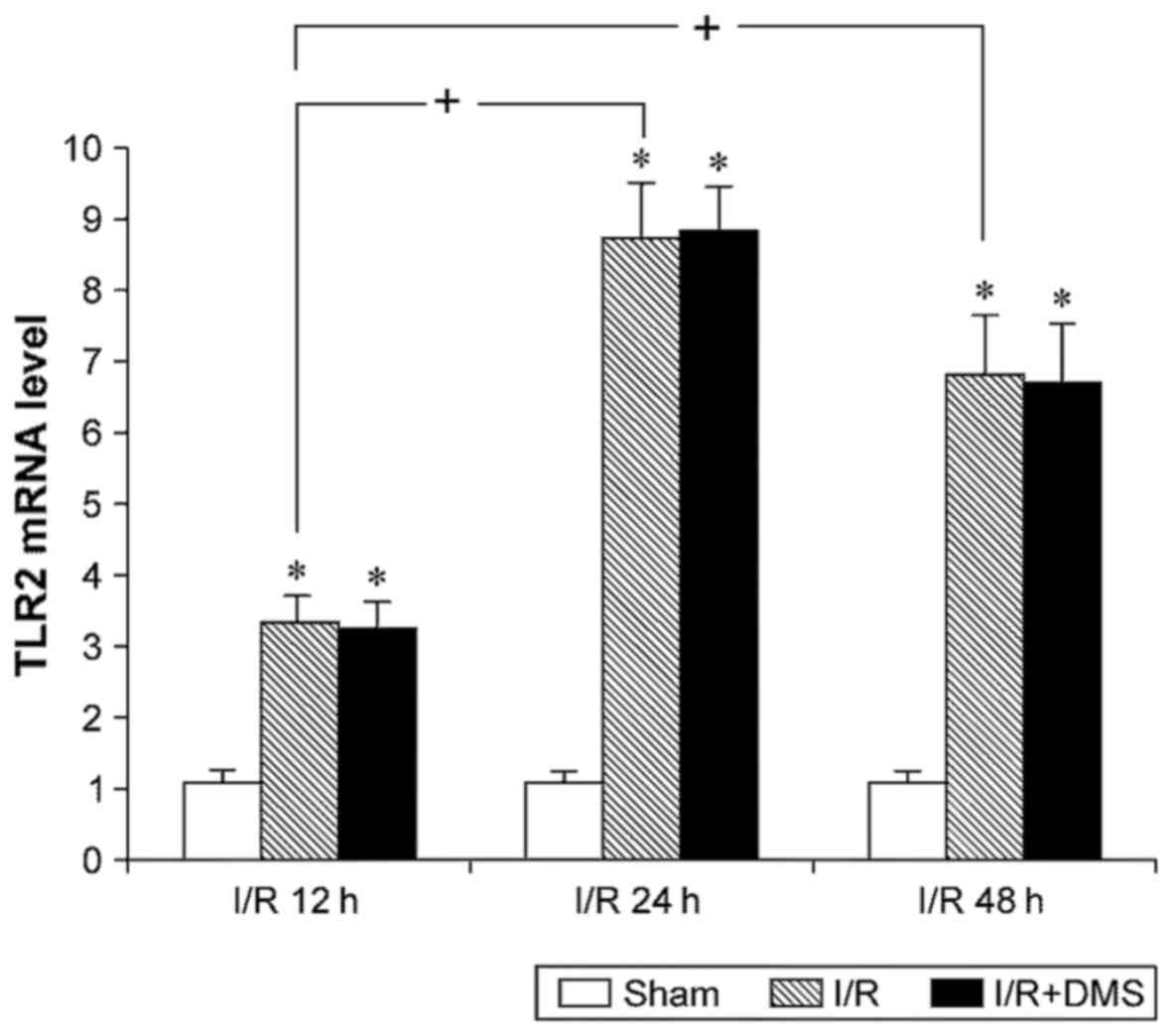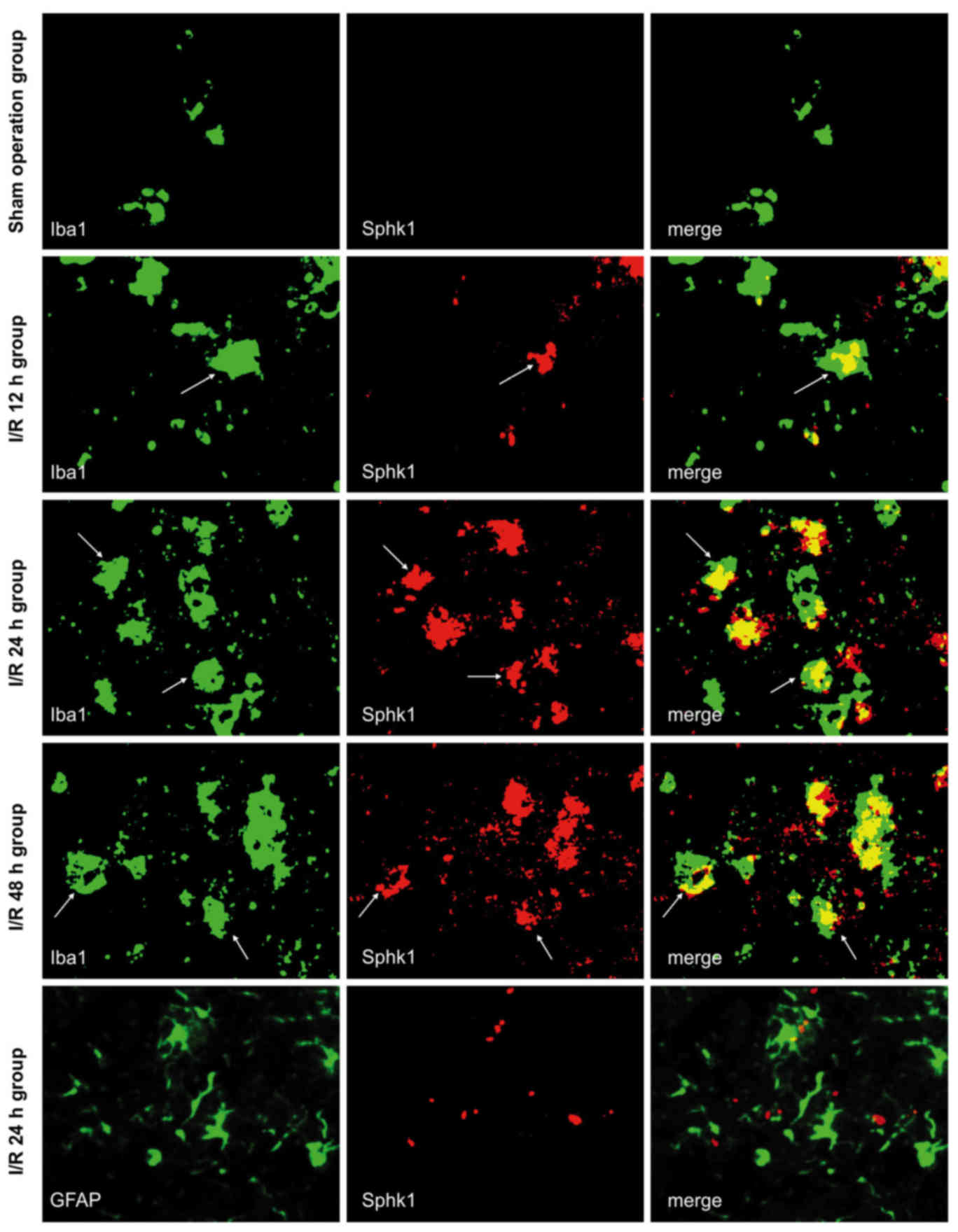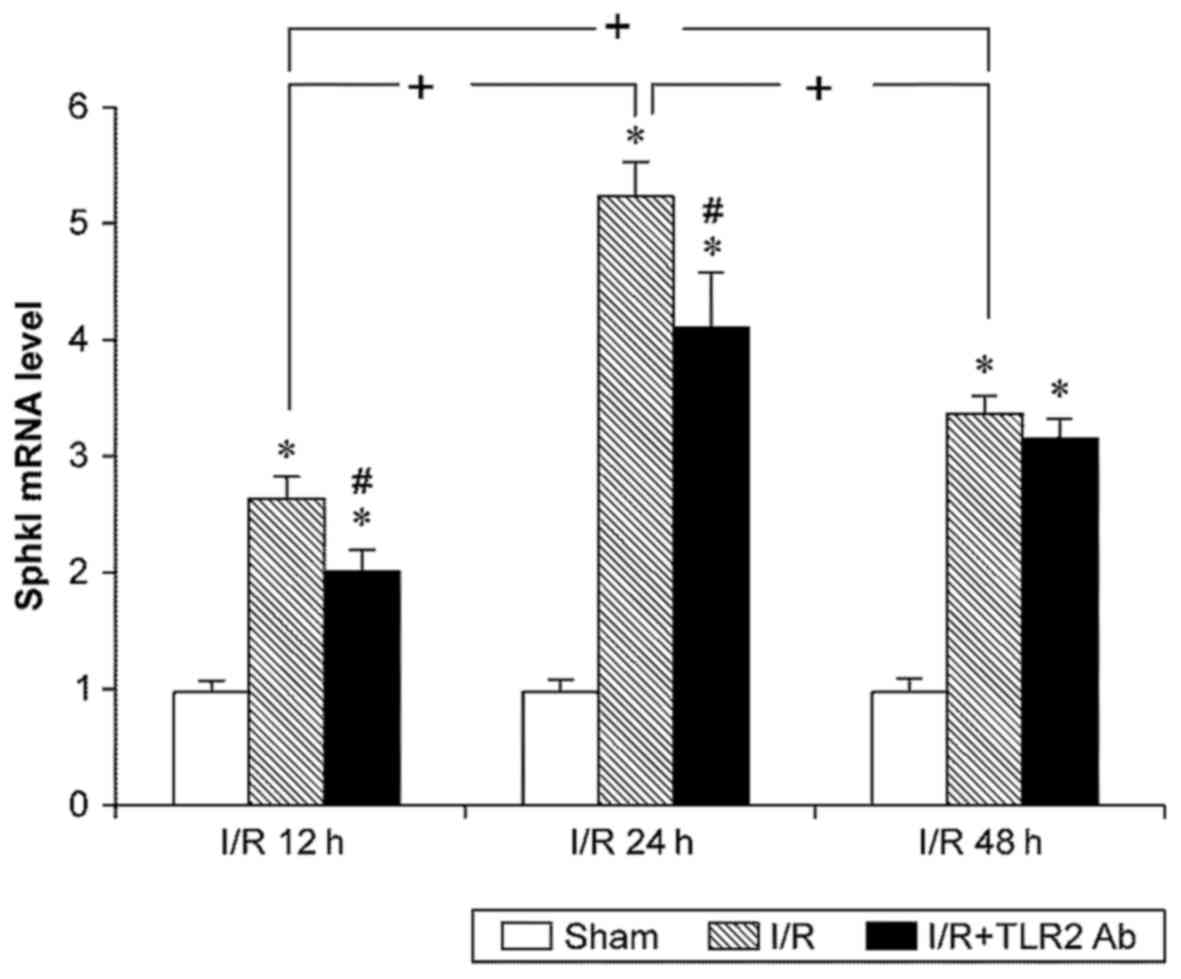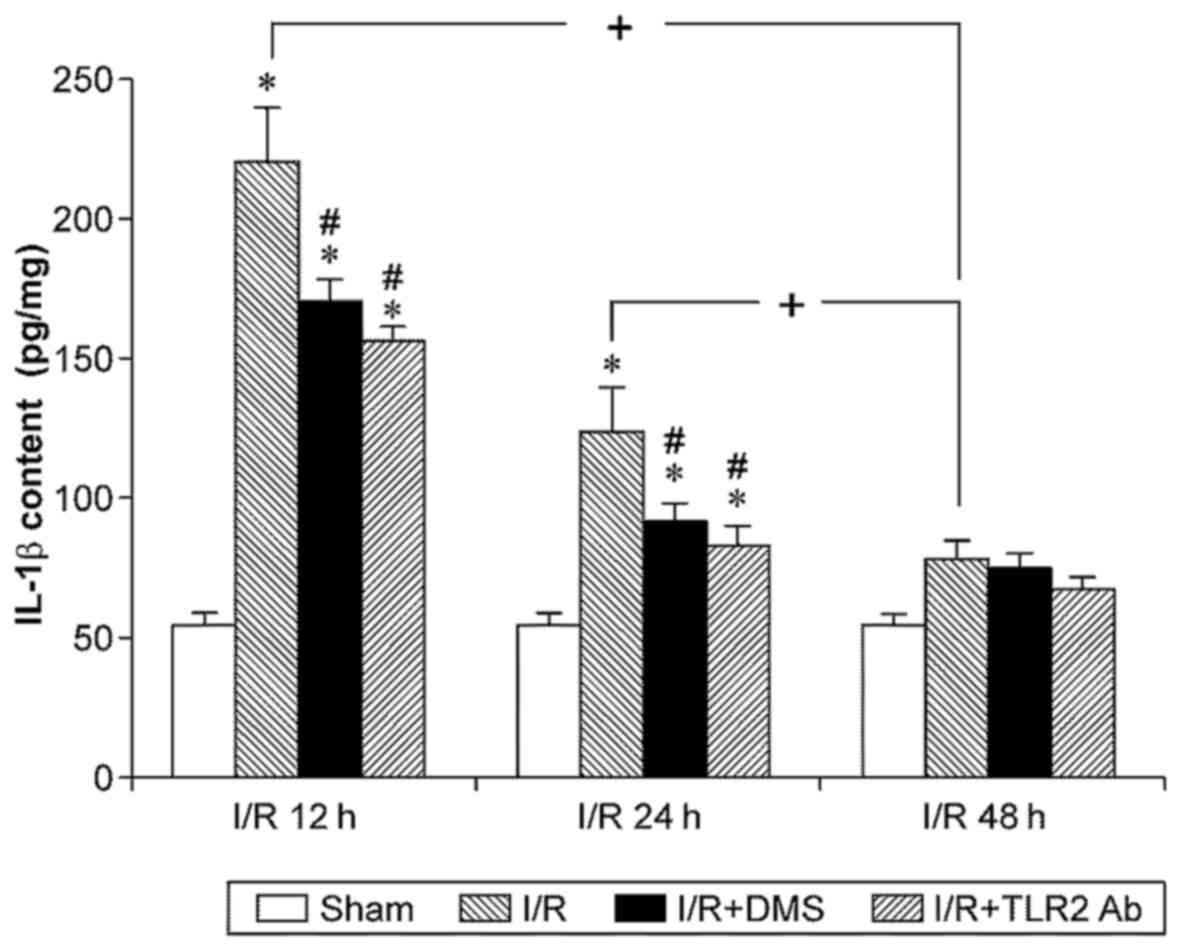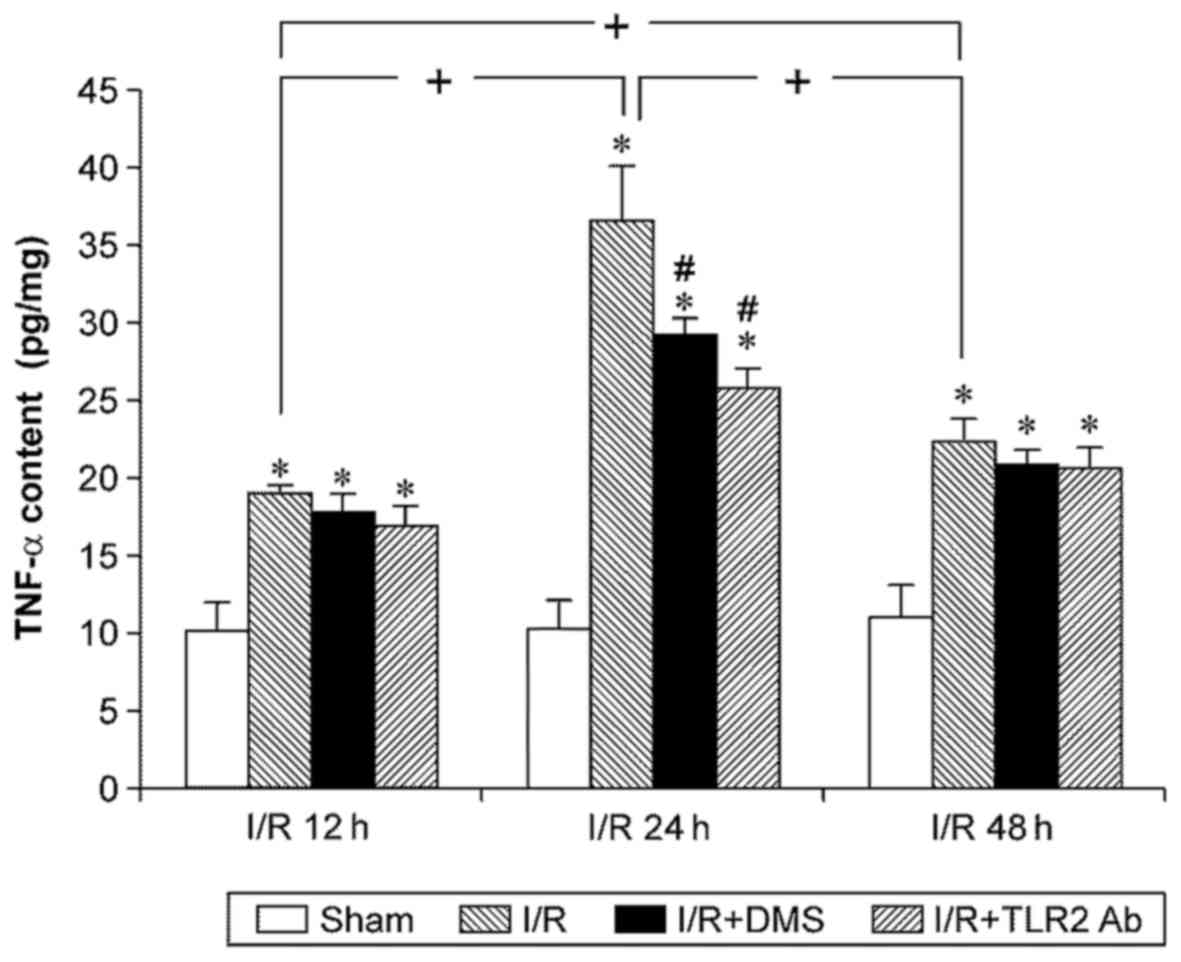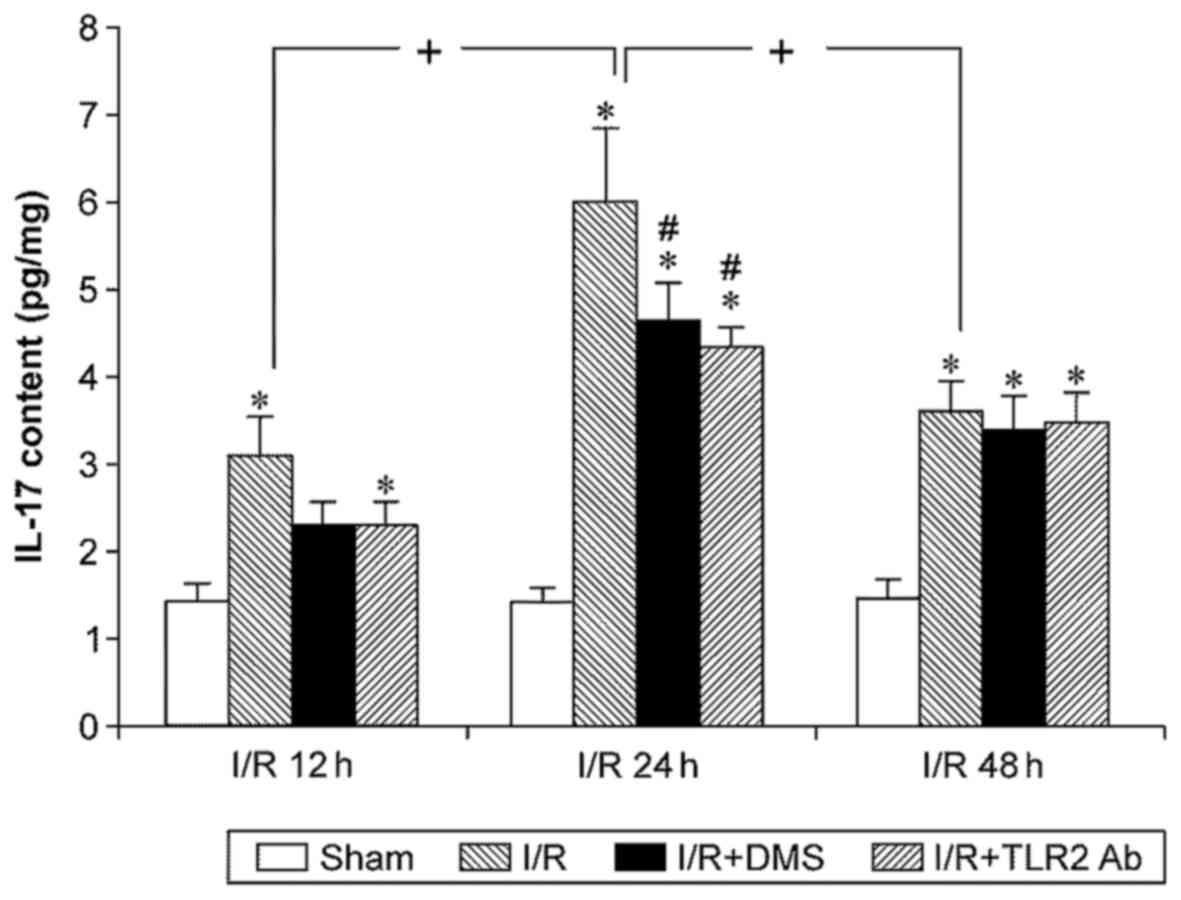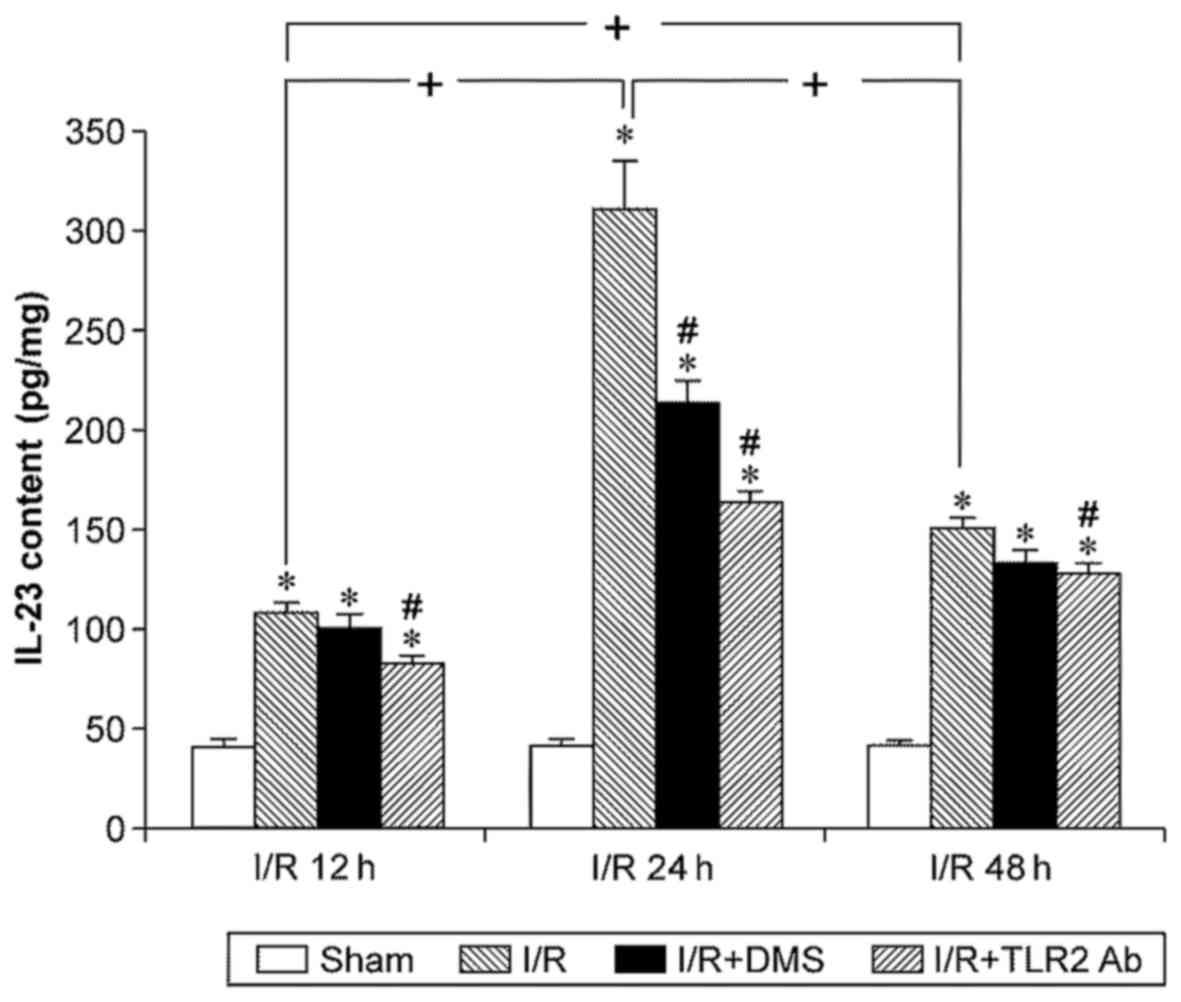|
1
|
Donnan GA, Fisher M, Macleod M and Davis
SM: Stroke. Lancet. 371:1612–1623. 2008. View Article : Google Scholar : PubMed/NCBI
|
|
2
|
Huang Y, Rabb H and Womer KL:
Ischemia-reperfusion and immediate T cell responses. Cell Immunol.
248:4–11. 2007. View Article : Google Scholar : PubMed/NCBI
|
|
3
|
Muir KW, Tyrrell P, Sattar N and Warburton
E: Inflammation and ischaemic stroke. Curr Opin Neurol. 20:334–342.
2007. View Article : Google Scholar : PubMed/NCBI
|
|
4
|
Olson JK and Miller SD: Microglia initiate
central nervous system innate and adaptive immune responses through
multiple TLRs. J Immunol. 173:3916–3924. 2004. View Article : Google Scholar : PubMed/NCBI
|
|
5
|
Dirnagl U, Iadecola C and Moskowitz MA:
Pathobiology of ischaemic stroke: An integrated view. Trends
Neurosci. 22:391–397. 1999. View Article : Google Scholar : PubMed/NCBI
|
|
6
|
Block ML and Hong JS: Microglia and
inflammation-mediated neurodegeneration: Multiple triggers with a
common mechanism. Prog Neurobiol. 76:77–98. 2005. View Article : Google Scholar : PubMed/NCBI
|
|
7
|
Block ML, Zecca L and Hong JS:
Microglia-mediated neurotoxicity: Uncovering the molecular
mechanisms. Nat Rev Neurosci. 8:57–69. 2007. View Article : Google Scholar
|
|
8
|
Lehnardt S: Innate immunity and
neuroinflammation in the CNS: The role of microglia in Toll-like
receptor-mediated neuronal injury. Glia. 58:253–263. 2010.
|
|
9
|
Lehnardt S, Henneke P, Lien E, Kasper DL,
Volpe JJ, Bechmann I, Nitsch R, Weber JR, Golenbock DT and
Vartanian T: A mechanism for neurodegeneration induced by group B
streptococci through activation of the TLR2/MyD88 pathway in
microglia. J Immunol. 177:583–592. 2006. View Article : Google Scholar : PubMed/NCBI
|
|
10
|
Li Y, Chu N, Hu A, Gran B, Rostami A and
Zhang GX: Increased IL-23p19 expression in multiple sclerosis
lesions and its induction in microglia. Brain. 130:490–501. 2007.
View Article : Google Scholar
|
|
11
|
Li Y, Chu N, Hu A, Gran B, Rostami A and
Zhang GX: Inducible IL-23p19 expression in human microglia via p38
MAPK and NF-kappaB signal pathways. Exp Mol Pathol. 84:1–8. 2008.
View Article : Google Scholar
|
|
12
|
Lv M, Liu Y, Zhang J, Sun L, Liu Z, Zhang
S, Wang B, Su D and Su Z: Roles of inflammation response in
microglia cell through Toll-like receptors
2/interleukin-23/interleukin-17 pathway in cerebral
ischemia/reperfusion injury. Neuroscience. 176:162–172. 2011.
View Article : Google Scholar
|
|
13
|
Alemany R, van Koppen CJ, Danneberg K, Ter
Braak M and Meyer Zu Heringdorf D: Regulation and functional roles
of sphingosine kinases. Naunyn Schmiedebergs Arch Pharmacol.
374:413–428. 2007. View Article : Google Scholar : PubMed/NCBI
|
|
14
|
Okada T, Kajimoto T, Jahangeer S and
Nakamura S: Sphingosine kinase/sphingosine 1-phosphate signalling
in central nervous system. Cell Signal. 21:7–13. 2009. View Article : Google Scholar
|
|
15
|
Ozaki H, Hla T and Lee MJ:
Sphingosine-1-phosphate signaling in endothelial activation. J
Atheroscler Thromb. 10:125–131. 2003. View Article : Google Scholar : PubMed/NCBI
|
|
16
|
Rosen H and Goetzl EJ: Sphingosine
1-phosphate and its receptors: An autocrine and paracrine network.
Nat Rev Immunol. 5:560–570. 2005. View
Article : Google Scholar : PubMed/NCBI
|
|
17
|
Alvarez SE, Milstien S and Spiegel S:
Autocrine and paracrine roles of sphingosine-1-phosphate. Trends
Endocrinol Metab. 18:300–307. 2007. View Article : Google Scholar : PubMed/NCBI
|
|
18
|
Gude DR, Alvarez SE, Paugh SW, Mitra P, Yu
J, Griffiths R, Barbour SE, Milstien S and Spiegel S: Apoptosis
induces expression of sphingosine kinase 1 to release
sphingosine-1-phosphate as a 'come-and-get-me' signal. FASEB J.
22:2629–2638. 2008. View Article : Google Scholar : PubMed/NCBI
|
|
19
|
Hammad SM, Crellin HG, Wu BX, Melton J,
Anelli V and Obeid LM: Dual and distinct roles for sphingosine
kinase 1 and sphingosine 1 phosphate in the response to
inflammatory stimuli in RAW macrophages. Prostaglandins Other Lipid
Mediat. 85:107–114. 2008. View Article : Google Scholar : PubMed/NCBI
|
|
20
|
Melendez AJ: Sphingosine kinase signalling
in immune cells: Potential as novel therapeutic targets. Biochim
Biophys Acta. 1784:66–75. 2008. View Article : Google Scholar
|
|
21
|
Haghikia A and Gold R:
Sphingosine-1-phosphate and its receptors as a possible therapeutic
target in autoimmune diseases of the nervous system. J
Neuroimmunol. 218:1–2. 2010. View Article : Google Scholar
|
|
22
|
Bryan L, Kordula T, Spiegel S and Milstien
S: Regulation and functions of sphingosine kinases in the brain.
Biochim Biophys Acta. 1781:459–466. 2008. View Article : Google Scholar : PubMed/NCBI
|
|
23
|
Hait NC, Oskeritzian CA, Paugh SW,
Milstien S and Spiegel S: Sphingosine kinases, sphingosine
1-phosphate, apoptosis and diseases. Biochim Biophys Acta.
1758:2016–2026. 2006. View Article : Google Scholar : PubMed/NCBI
|
|
24
|
Ibrahim FB, Pang SJ and Melendez AJ:
Anaphylatoxin signaling in human neutrophils. A key role for
sphingosine kinase. J Biol Chem. 279:44802–44811. 2004. View Article : Google Scholar : PubMed/NCBI
|
|
25
|
Blondeau N, Lai Y, Tyndall S, Popolo M,
Topalkara K, Pru JK, Zhang L, Kim H, Liao JK, Ding K, et al:
Distribution of sphingosine kinase activity and mRNA in rodent
brain. J Neurochem. 103:509–517. 2007. View Article : Google Scholar : PubMed/NCBI
|
|
26
|
Fukuda Y, Kihara A and Igarashi Y:
Distribution of sphingosine kinase activity in mouse tissues:
Contribution of SPHK1. Biochem Biophys Res Commun. 309:155–160.
2003. View Article : Google Scholar : PubMed/NCBI
|
|
27
|
Tham CS, Lin FF, Rao TS, Yu N and Webb M:
Microglial activation state and lysophospholipid acid receptor
expression. Int J Dev Neurosci. 21:431–443. 2003. View Article : Google Scholar : PubMed/NCBI
|
|
28
|
Nayak D, Huo Y, Kwang WX, Pushparaj PN,
Kumar SD, Ling EA and Dheen ST: Sphingosine kinase 1 regulates the
expression of proinflammatory cytokines and nitric oxide in
activated microglia. Neuroscience. 166:132–144. 2010. View Article : Google Scholar
|
|
29
|
Lin H, Baby N, Lu J, Kaur C, Zhang C, Xu
J, Ling EA and Dheen ST: Expression of sphingosine kinase 1 in
amoeboid microglial cells in the corpus callosum of postnatal rats.
J Neuroinflammation. 8:132011. View Article : Google Scholar : PubMed/NCBI
|
|
30
|
Maceyka M, Payne SG, Milstien S and
Spiegel S: Sphingosine kinase, sphingosine-1-phosphate, and
apoptosis. Biochim Biophys Acta. 1585:193–201. 2002. View Article : Google Scholar
|
|
31
|
Aliprantis AO, Yang RB, Weiss DS, Godowski
P and Zychlinsky A: The apoptotic signaling pathway activated by
Toll-like receptor-2. EMBO J. 19:3325–3336. 2000. View Article : Google Scholar : PubMed/NCBI
|
|
32
|
Karikó K, Weissman D and Welsh FA:
Inhibition of Toll-like receptor and cytokine signaling - a
unifying theme in ischemic tolerance. J Cereb Blood Flow Metab.
24:1288–1304. 2004. View Article : Google Scholar
|
|
33
|
Kielian T: Toll-like receptors in central
nervous system glial inflammation and homeostasis. J Neurosci Res.
83:711–730. 2006. View Article : Google Scholar : PubMed/NCBI
|
|
34
|
Zhang G and Ghosh S: Toll-like
receptor-mediated NF-kappaB activation: A phylogenetically
conserved paradigm in innate immunity. J Clin Invest. 107:13–19.
2001. View
Article : Google Scholar : PubMed/NCBI
|
|
35
|
Wu W, Mosteller RD and Broek D:
Sphingosine kinase protects lipopolysaccharide-activated
macrophages from apoptosis. Mol Cell Biol. 24:7359–7369. 2004.
View Article : Google Scholar : PubMed/NCBI
|
|
36
|
Neumann J, Sauerzweig S, Rönicke R, Gunzer
F, Dinkel K, Ullrich O, Gunzer M and Reymann KG: Microglia cells
protect neurons by direct engulfment of invading neutrophil
granulocytes: A new mechanism of CNS immune privilege. J Neurosci.
28:5965–5975. 2008. View Article : Google Scholar : PubMed/NCBI
|
|
37
|
Colton CA and Gilbert DL: Production of
superoxide anions by a CNS macrophage, the microglia. FEBS Lett.
223:284–288. 1987. View Article : Google Scholar : PubMed/NCBI
|
|
38
|
Lee SC, Liu W, Dickson DW, Brosnan CF and
Berman JW: Cytokine production by human fetal microglia and
astrocytes. Differential induction by lipopolysaccharide and IL-1
beta. J Immunol. 150:2659–2667. 1993.PubMed/NCBI
|
|
39
|
Moss DW and Bates TE: Activation of murine
microglial cell lines by lipopolysaccharide and interferon-gamma
causes NO-mediated decreases in mitochondrial and cellular
function. Eur J Neurosci. 13:529–538. 2001. View Article : Google Scholar : PubMed/NCBI
|
|
40
|
Liu B, Gao HM, Wang JY, Jeohn GH, Cooper
CL and Hong JS: Role of nitric oxide in inflammation-mediated
neurodegeneration. Ann NY Acad Sci. 962:318–331. 2002. View Article : Google Scholar : PubMed/NCBI
|
|
41
|
Sawada M, Kondo N, Suzumura A and
Marunouchi T: Production of tumor necrosis factor-alpha by
microglia and astrocytes in culture. Brain Res. 491:394–397. 1989.
View Article : Google Scholar : PubMed/NCBI
|
|
42
|
Yenari MA, Kauppinen TM and Swanson RA:
Microglial activation in stroke: Therapeutic targets.
Neurotherapeutics. 7:378–391. 2010. View Article : Google Scholar : PubMed/NCBI
|
|
43
|
Lambertsen KL, Meldgaard M, Ladeby R and
Finsen B: A quantitative study of microglial-macrophage synthesis
of tumor necrosis factor during acute and late focal cerebral
ischemia in mice. J Cereb Blood Flow Metab. 25:119–135. 2005.
View Article : Google Scholar : PubMed/NCBI
|
|
44
|
Minami M, Kuraishi Y, Yabuuchi K, Yamazaki
A and Satoh M: Induction of interleukin-1 beta mRNA in rat brain
after transient forebrain ischemia. J Neurochem. 58:390–392. 1992.
View Article : Google Scholar : PubMed/NCBI
|
|
45
|
Block F, Peters M and Nolden-Koch M:
Expression of IL-6 in the ischemic penumbra. Neuroreport.
11:963–967. 2000. View Article : Google Scholar : PubMed/NCBI
|
|
46
|
Nishimura M and Naito S: Tissue-specific
mRNA expression profiles of human Toll-like receptors and related
genes. Biol Pharm Bull. 28:886–892. 2005. View Article : Google Scholar : PubMed/NCBI
|
|
47
|
Caso JR, Pradillo JM, Hurtado O, Lorenzo
P, Moro MA and Lizasoain I: Toll-like receptor 4 is involved in
brain damage and inflammation after experimental stroke.
Circulation. 115:1599–1608. 2007. View Article : Google Scholar : PubMed/NCBI
|
|
48
|
Abate W, Alghaithy AA, Parton J, Jones KP
and Jackson SK: Surfactant lipids regulate LPS-induced
interleukin-8 production in A549 lung epithelial cells by
inhibiting translocation of TLR4 into lipid raft domains. J Lipid
Res. 51:334–344. 2010. View Article : Google Scholar :
|
|
49
|
Tasaki K, Ruetzler CA, Ohtsuki T, Martin
D, Nawashiro H and Hallenbeck JM: Lipopolysaccharide pre-treatment
induces resistance against subsequent focal cerebral ischemic
damage in spontaneously hypertensive rats. Brain Res. 748:267–270.
1997. View Article : Google Scholar : PubMed/NCBI
|
|
50
|
Hua F, Ma J, Ha T, Xia Y, Kelley J,
Williams DL, Kao RL, Browder IW, Schweitzer JB, Kalbfleisch JH, et
al: Activation of Toll-like receptor 4 signaling contributes to
hippocampal neuronal death following global cerebral
ischemia/reperfusion. J Neuroimmunol. 190:101–111. 2007. View Article : Google Scholar : PubMed/NCBI
|
|
51
|
Cao CX, Yang QW, Lv FL, Cui J, Fu HB and
Wang JZ: Reduced cerebral ischemia-reperfusion injury in Toll-like
receptor 4 deficient mice. Biochem Biophys Res Commun. 353:509–514.
2007. View Article : Google Scholar
|
|
52
|
Ziegler G, Harhausen D, Schepers C,
Hoffmann O, Röhr C, Prinz V, König J, Lehrach H, Nietfeld W and
Trendelenburg G: TLR2 has a detrimental role in mouse transient
focal cerebral ischemia. Biochem Biophys Res Commun. 359:574–579.
2007. View Article : Google Scholar : PubMed/NCBI
|
|
53
|
Lai WQ, Goh HH, Bao Z, Wong WS, Melendez
AJ and Leung BP: The role of sphingosine kinase in a murine model
of allergic asthma. J Immunol. 180:4323–4329. 2008. View Article : Google Scholar : PubMed/NCBI
|
|
54
|
Snider AJ, Kawamori T, Bradshaw SG, Orr
KA, Gilkeson GS, Hannun YA and Obeid LM: A role for sphingosine
kinase 1 in dextran sulfate sodium-induced colitis. FASEB J.
23:143–152. 2009. View Article : Google Scholar :
|
|
55
|
Puneet P, Yap CT, Wong L, Lam Y, Koh DR,
Moochhala S, Pfeilschifter J, Huwiler A and Melendez AJ: SphK1
regulates proinflammatory responses associated with endotoxin and
poly-microbial sepsis. Science. 328:1290–1294. 2010. View Article : Google Scholar : PubMed/NCBI
|
|
56
|
Lambertsen KL, Biber K and Finsen B:
Inflammatory cytokines in experimental and human stroke. J Cereb
Blood Flow Metab. 32:1677–1698. 2012. View Article : Google Scholar : PubMed/NCBI
|
|
57
|
Lehnardt S, Lehmann S, Kaul D, Tschimmel
K, Hoffmann O, Cho S, Krueger C, Nitsch R, Meisel A and Weber JR:
Toll-like receptor 2 mediates CNS injury in focal cerebral
ischemia. J Neuroimmunol. 190:28–33. 2007. View Article : Google Scholar : PubMed/NCBI
|
|
58
|
Caso JR, Pradillo JM, Hurtado O, Leza JC,
Moro MA and Lizasoain I: Toll-like receptor 4 is involved in
subacute stress-induced neuroinflammation and in the worsening of
experimental stroke. Stroke. 39:1314–1320. 2008. View Article : Google Scholar : PubMed/NCBI
|
|
59
|
Kilic U, Kilic E, Matter CM, Bassetti CL
and Hermann DM: TLR-4 deficiency protects against focal cerebral
ischemia and axotomy-induced neurodegeneration. Neurobiol Dis.
31:33–40. 2008. View Article : Google Scholar : PubMed/NCBI
|
|
60
|
Hoffmann O, Braun JS, Becker D, Halle A,
Freyer D, Dagand E, Lehnardt S and Weber JR: TLR2 mediates
neuroinflammation and neuronal damage. J Immunol. 178:6476–6481.
2007. View Article : Google Scholar : PubMed/NCBI
|
|
61
|
Mishra BB, Mishra PK and Teale JM:
Expression and distribution of Toll-like receptors in the brain
during murine neurocysticercosis. J Neuroimmunol. 181:46–56. 2006.
View Article : Google Scholar : PubMed/NCBI
|
|
62
|
Benakanakere MR, Zhao J, Galicia JC,
Martin M and Kinane DF: Sphingosine kinase-1 is required for toll
mediated beta-defensin 2 induction in human oral keratinocytes.
PLoS One. 5:e115122010. View Article : Google Scholar : PubMed/NCBI
|
|
63
|
Pitson SM, Moretti PA, Zebol JR, Lynn HE,
Xia P, Vadas MA and Wattenberg BW: Activation of sphingosine kinase
1 by ERK1/2-mediated phosphorylation. EMBO J. 22:5491–5500. 2003.
View Article : Google Scholar : PubMed/NCBI
|
|
64
|
Spiegel S and Milstien S:
Sphingosine-1-phosphate: An enigmatic signalling lipid. Nat Rev Mol
Cell Biol. 4:397–407. 2003. View Article : Google Scholar : PubMed/NCBI
|
|
65
|
Pchejetski D, Nunes J, Coughlan K, Lall H,
Pitson SM, Waxman J and Sumbayev VV: The involvement of sphingosine
kinase 1 in LPS-induced Toll-like receptor 4-mediated accumulation
of HIF-1α protein, activation of ASK1 and production of the
pro-inflammatory cytokine IL-6. Immunol Cell Biol. 89:268–274.
2011. View Article : Google Scholar
|















